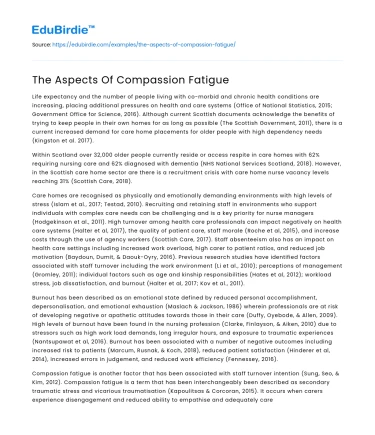Life expectancy and the number of people living with co-morbid and chronic health conditions are increasing, placing additional pressures on health and care systems (Office of National Statistics, 2015; Government Office for Science, 2016). Although current Scottish documents acknowledge the benefits of trying to keep people in their own homes for as long as possible (The Scottish Government, 2011), there is a current increased demand for care home placements for older people with high dependency needs (Kingston et al. 2017).
Within Scotland over 32,000 older people currently reside or access respite in care homes with 62% requiring nursing care and 62% diagnosed with dementia (NHS National Services Scotland, 2018). However, in the Scottish care home sector are there is a recruitment crisis with care home nurse vacancy levels reaching 31% (Scottish Care, 2018).
Save your time!
We can take care of your essay
- Proper editing and formatting
- Free revision, title page, and bibliography
- Flexible prices and money-back guarantee
Care homes are recognised as physically and emotionally demanding environments with high levels of stress (Islam et al., 2017; Testad, 2010). Recruiting and retaining staff in environments who support individuals with complex care needs can be challenging and is a key priority for nurse managers (Hodgekinson et al., 2011). High turnover among health care professionals can impact negatively on health care systems (Halter et al, 2017), the quality of patient care, staff morale (Roche et al, 2015), and increase costs through the use of agency workers (Scottish Care, 2017). Staff absenteeism also has an impact on health care settings including increased work overload, high carer to patient ratios, and reduced job motivation (Baydoun, Dumit, & Daouk-Oyry, 2016). Previous research studies have identified factors associated with staff turnover including the work environment (Li et al., 2010); perceptions of management (Gromley, 2011); individual factors such as age and kinship responsibilities (Hates et al, 2012); workload stress, job dissatisfaction, and burnout (Halter et al, 2017; Kov et al., 2011).
Burnout has been described as an emotional state defined by reduced personal accomplishment, depersonalisation, and emotional exhaustion (Maslach & Jackson, 1986) wherein professionals are at risk of developing negative or apathetic attitudes towards those in their care (Duffy, Oyebode, & Allen, 2009). High levels of burnout have been found in the nursing profession (Clarke, Finlayson, & Aiken, 2010) due to stressors such as high work load demands, long irregular hours, and exposure to traumatic experiences (Nantsupawat et al, 2016). Burnout has been associated with a number of negative outcomes including increased risk to patients (Marcum, Rusnak, & Koch, 2018), reduced patient satisfaction (Hinderer et al, 2014), increased errors in judgement, and reduced work efficiency (Fennessey, 2016).
Compassion fatigue is another factor that has been associated with staff turnover intention (Sung, Seo, & Kim, 2012). Compassion fatigue is a term that has been interchangeably been described as secondary traumatic stress and vicarious traumatisation (Kapoulitsas & Corcoran, 2015). It occurs when carers experience disengagement and reduced ability to empathise and adequately care for their patients (Coetzee & Laschinger, 2018). In a recent literature review Coetzee and Laschinger (2018) identified a number of models that have been developed to understand compassion fatigue. The compassion stress and fatigue model developed by Figley, (1995, 2002) asserts that empathic ability of the carer is central to understanding compassion fatigue. It is theorised that empathic concern and the need to respond can lean to compassion stress which can be managed by either disengagement or compassion satisfaction. Ongoing exposure to traumatic and emotive memories can result in the carer developing compassion fatigue (Coetzee & Laschinger, 2018).
Valent’s (1995, 2002) framework of secondary stress and trauma asserts that the carers appraisal of their exposure to stress can result in adaptive of maladaptive biological and psychological responses. These responses aim to reduce the impact of chronic strain and trauma, leading to compassion fatigue (Coetzee & Laschinger, 2018).
Stamm (2010) put forward a model that suggested that outcome of the carers experience is impacted by those in their care, alongside their personal and professional environments. Named the professional quality of life model it postulates that outcomes of care can be positive or negative or result in compassion satisfaction or compassion fatigue. Although previously compassion fatigue was considered to be a concept that sits apart from burnout (Marcum et al, 2018), this model theorises it as a term to describe combined burnout and secondary traumatic stress (Coetzee & Laschinger, 2018).






 Stuck on your essay?
Stuck on your essay?

